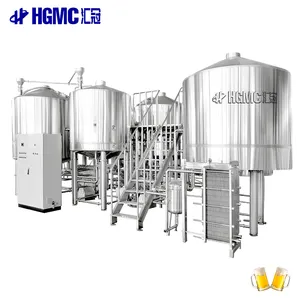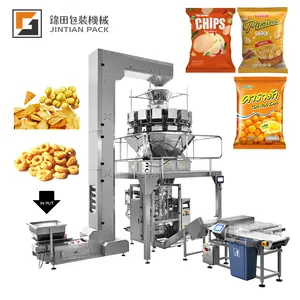Types of Custom Food Processing Machinery
A variety of custom food processing machinery is available to handle, cut, slice, dice, mix, fry, fill, pack, paste, filter, and spray different types of food and food ingredients. The food processing industry uses the following types of food processing machines:
- Food handling: Conveyors, elevators, inclines, and chutes are examples of food handling machines used to transfer, position, and orient food products during processing operations.
- Food cutting: Food cutting machines are used to cut and create smaller units of food. Such machines are usually customized to cut specific food types with the desired shape, size, and thickness. The most common types of food cutting machines include dicers, washers, slicers, cutters, choppers, shredder, milling machines, and food grinders.
- Mixing: Custom food processing mixers are used to combine various components evenly. With the help of these mixers, different types of food materials, liquids, and additives can be combined.
- Frying: Industrial food frying machines are used to prepare potatoes, snacks, and other types of food by immersing them in oil at high temperatures to achieve the desired level of crispness and flavor.
- Filling: Food filling machines are used to accurately and efficiently fill food products into containers, such as bottles, jars, pouches, and cups.
- Packaging: Food packaging machines are used in the automated food processing industry to package food products in different containers, including bottles, pouches, boxes, and cups, for storage and distribution purposes.
- Food filtering: Food filtration machines are used to remove unwanted particles, impurities, and contaminants from solid or liquid food substances.
- Atomizer: Food atomizer machines are used to spray or disintegrate food products into fine droplets or particles. This is commonly used in the production of food coatings, flavorings, and encapsulated formulations.
Specification and maintenance of custom food processing machinery
Specifications
-
Capacity:
Mainly refer to the amount of processed food items the machine can handle within a specific time period. Usually, it is measured in units per hour or kg per hour.
-
Power:
It refers mainly to the motor power of the machine, which is usually measured in kilowatts (kw) or horsepower (hp).
-
Dimensions:
Those include length, width, and height, which determine the size and space requirements of the machinery.
-
Weight:
This is the cumulative weight of a piece of custom food processing machinery, which determines the stability and handling of the equipment.
-
Materials:
Materials used in food processing machines usually are stainless steel and other materials that meet food safety standards.
-
Automation:
It refers to whether the machine is equipped with automated functions, such as programmable controls, touch-screen interfaces, etc.
-
Energy Efficiency:
Some custom food processing machines are energy-saving models, which can reduce energy consumption and environmental impact.
Maintenance
Regular maintenance and cleaning ensure hygiene and food safety, as well as optimize machinery performance. Here's some food processing equipment maintenance tips:
-
Regular cleaning:
Clean food processing machinery on a daily basis to prevent contaminants and food residue from accumulating. Use hot, soapy water and disinfectants to clean surfaces, tools, and containers to ensure food safety.
-
Lubricate moving parts:
Food processing machines have many moving parts, such as chains, belts, bearings, etc. Lubricating them regularly ensures smooth operation and reduces friction and abrasion.
-
Replace wearing parts:
Food processing machines usually have some wearing parts, such as blades, grinding discs, etc. Custom food processing equipment owners need to regularly check and replace these parts to ensure the machine works properly and the processed food meets the requirements.
-
Calibrate equipment:
Some custom food processing machines require periodic calibration to ensure accuracy and stability. For example, adjusting weighing devices and measuring devices to ensure food processing according to the set values and ratios.
-
Regular inspections:
Inspect food processing machines regularly to check for loose parts, abnormal noises, leaks, etc. Take appropriate measures to repair or adjust them if needed to ensure equipment stability and reliability.
Scenarios of custom food processing machinery
Various types of custom food processing equipment are used in the restaurant business. The overall growth of the restaurant business creates an insatiable demand for efficient custom food processing machinery.
- High-Speed Production Lines: In sectors like bread and pastry manufacturing, where timeliness is of the utmost importance, custom food processing equipment is essential for producing vast amounts of goods quickly and effectively.
- Product Variety: Custom food processing machines are essential for creating food items with varied flavors, forms, and textures, such as snacks, ice cream, and canned goods, as well as for adapting production lines to meet
- Consistent Quality is a Must: Custom food processing equipment is used in the dairy and meat industries, where standardization is crucial to guarantee uniformity in taste, texture, and other product qualities across all batches.
- Packaging and Convenience: Custom food processing is crucial for preparing and packaging convenience foods like ready-to-eat meals, frozen veggies, and canned produce, which enables swift processing, packing, and shipment.
- Sanitation and Food Safety: Custom food processing ensures the strict hygiene standards required in the pharmaceuticals and health foods industries, which include production areas for dietary supplements and functional foods. These are implemented to stop contamination while also handling and processing raw materials.
- Maximizing productivity: Custom food processing machinery helps industries like agriculture, where a huge volume of raw materials needs to be processed, optimize production by rapidly and effectively processing crops into goods like juices, jams, or canned items.
- Automation and Control: Custom food processing machinery is used in areas like brewing and distilling, where precise control and automation are essential to manage complex processes, monitor, and control every step from fermentation to bottling.
- Reducing Labor Costs: Custom food processing equipment reduces the need for manual labor and boost productivity in the assembly and manufacturing lines, which aids in lowering labor costs and increasing efficiency in industries like textiles, where continuous processing of large volumes is required.
How to choose custom food processing machinery
Choosing the food processing machinery for a certain custom food is like searching for the missing pieces of a puzzling supply chain. All parts need to fit together for seamless food production and delivery. Here's how to choose food processing equipment, step by step.
- Food item: The first step is to identify what food item will be processed. If it's a customized food item, collaborate with food scientists and chefs to pinpoint key ingredients, flavors, textures, and nutritional aspects critical to the food item's success. Create a comprehensive list of requirements the food processing machinery must meet to ensure the custom food can be produced efficiently and consistently.
- Production volume: When determining the nature of the custom food item, also take note of what the expected production volume will be. Consider the maximum capacity. Will three shifts of processing be required? One crucial parameter to think about when deciding custom food processing equipment is whether the scheduled maintenance can fit into the time allowance from the expected production volume.
- Integration: The piece of custom food processing machinery should integrate smoothly with existing custom food processing equipment. For example, some custom pizza processing machinery is designed specifically to work with certain types of dough and certain types of toppings so that distinct custom pizzas can be produced with ease.
- Scalability: Custom food processing requirements may change as business needs change. Food processing machinery that can be scaled up or down according to varying requirements will save significant time and cost over the long run.
- Automation: New custom food processing machinery may need to be automated to the same level as the older equipment to reduce manual labor and streamline food production steps.
- Cleanliness: Food processing machinery must be cleaned easily and thoroughly to ensure hygiene, safety, and compliance with custom food processing standards. Choose equipment optimized for efficient cleaning processes to minimize downtime and maintain consistent food quality.
- Budget: Factor in the total cost of the custom food processing machinery. This should include installation and custom parts expenses, customization costs, employee training expense, and long-term maintenance and energy costs.
- Safety: Ensure that the custom food processing machinery meets the latest safety standards and complies with international food industry regulations. Remember, employee safety is of utmost importance, so look for processing technology with child-friendly parts.
Custom food processing machinery FAQ
Q1: What is the purpose of custom food processing machinery?
A1: Food Custom processing food machinery may accomplish a variety of objectives, including cutting, chopping, grinding, mixing, mashing, whipping, emulsifying, or any other specific processing task required by the recipe or intended food product.
Q2: Are custom food processing machines safe?
A2: Custom food processing machinery generally has safety features like guards, emergency stop buttons, and safety interlocks. However, following the manufacturer's instructions and guidelines for safe operation is crucial.
Q3: Can custom food processing machinery be automated?
A3: Many custom food processing machines can be automated and integrated into larger automated food production systems. Automation improves efficiency, consistency, and productivity.
Q4: What are some examples of custom food processing machines?
A4: Some examples of custom food processing machines include custom mixing machines, meat grinders, food emulsifiers, food mixing machines, food crushers, and custom vacuum mixers.
Q5: Can custom food processing machinery be sterilized?
A5: Yes, custom food processing machines can be sterilized using chemical, thermal, or mechanical methods. Regular sterilization is essential to maintain food safety and prevent contamination.
















































